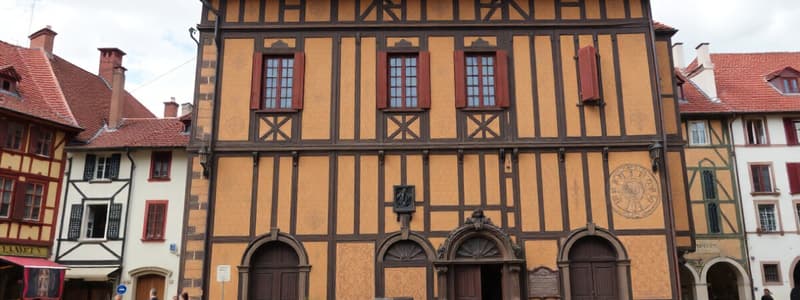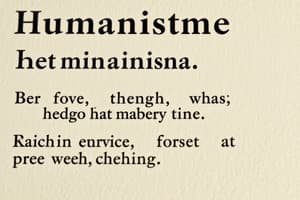Podcast
Questions and Answers
How did the feudal system primarily organize society during the Middle Ages?
How did the feudal system primarily organize society during the Middle Ages?
- As a result of mercantile practices
- Through democratic elections
- By virtue of military conquests
- Based on land ownership and obligations (correct)
Which group was typically at the top of the social hierarchy during the Middle Ages?
Which group was typically at the top of the social hierarchy during the Middle Ages?
- Clergy
- Peasantry
- Nobility (correct)
- Freemen
What role did indulgences play in the context of religious practices during the Middle Ages?
What role did indulgences play in the context of religious practices during the Middle Ages?
- They were punishments for heresy.
- They were believed to reduce time in purgatory. (correct)
- They served as a means to fund the clergy.
- They provided a form of financial support to the monarchy.
What was one significant impact of the Black Death on European society?
What was one significant impact of the Black Death on European society?
How did the rise of city-states contribute to the expansion of trade during the Renaissance?
How did the rise of city-states contribute to the expansion of trade during the Renaissance?
What was one of the significant contributions of classical civilizations to society?
What was one of the significant contributions of classical civilizations to society?
Which of the following best describes the scientific method?
Which of the following best describes the scientific method?
Which artist is renowned for using perspective in art during the Renaissance?
Which artist is renowned for using perspective in art during the Renaissance?
What were the three “G’s” related to European exploration?
What were the three “G’s” related to European exploration?
Which technological advancement had a significant impact on the Age of Exploration?
Which technological advancement had a significant impact on the Age of Exploration?
What was one of the major consequences of imperialism for indigenous people?
What was one of the major consequences of imperialism for indigenous people?
Who is credited with challenging the Catholic Church through the 95 Theses?
Who is credited with challenging the Catholic Church through the 95 Theses?
Which country conquered the Incas and Aztecs during the Age of Exploration?
Which country conquered the Incas and Aztecs during the Age of Exploration?
Flashcards
Feudalism
Feudalism
A system of social organization where land is granted by a lord to a vassal in exchange for loyalty and military service.
Nobility
Nobility
A social group with inherited rights and privileges, often holding positions of power.
Excommunication
Excommunication
Excommunication is the act of formally excluding a person from the Christian Church, cutting them off from religious participation and communion.
Renaissance
Renaissance
Signup and view all the flashcards
Imperialism
Imperialism
Signup and view all the flashcards
Scientific method
Scientific method
Signup and view all the flashcards
Anatomy
Anatomy
Signup and view all the flashcards
Protestantism
Protestantism
Signup and view all the flashcards
Hypothesis
Hypothesis
Signup and view all the flashcards
Indulgences
Indulgences
Signup and view all the flashcards
Spain
Spain
Signup and view all the flashcards
Dissemination of Information
Dissemination of Information
Signup and view all the flashcards
Study Notes
Renaissance Study Guide
- Key Terms:
- City-states: Independent urban centers with their own governments and economies; examples include Florence, Venice, and Genoa.
- Nobility: The aristocratic class holding significant social, political, and economic power.
- Excommunication: Formal expulsion from the Christian Church, resulting in severe social consequences.
- Expansionism: Policy of territorial and economic growth.
- Eurocentrism: Focusing on European perspectives to the exclusion of others.
- Feudalism: A social system where land ownership and obligations are mutually dependent.
- Freeman/Serf: Different social classes within a feudal society.
- Heresy: Belief or opinion contrary to established doctrine, often punished severely.
- Mercantilism: Economic system for maximum profit from trade (exports and minimizing imports).
- Circumnavigate: To sail completely around the world.
- Hierarchy: A system of ranks and levels, often observed in the nobility, church, and government.
- Classical Era: Period relating to the ancient Greeks and Romans, used as a model and inspiration.
- Imperialism: Control over a territory and its resources. Often includes subjugating people.
- Manor: Large estates in a feudal system, self-sufficient and controlled by a lord.
- Merchant: Traders who brought goods and ideas throughout Europe.
- Humanist: Those who emphasized human potential and achievement, often reviving classical traditions.
- Indigenous: People native to a specific region.
- Monastery: A community devoted to monastic or religious practices.
- Immunity: The body’s ability to fight off infections and disease.
- Scientific Method: A systematic approach to acquiring knowledge through testing and experimentation.
- Indulgences: Religious pardons for sins sold by the church. (often criticised).
- Monarchy: System of government headed by a king or queen.
- Vernacular: The common language of a region; everyday speech.
- Clergy: Religious leaders.
The Middle Ages
- Concept: How society was organized in the Middle Ages.
- Significance: Understanding the social structure, including the roles of the nobility, clergy, and common people.
- Concept: Religious Beliefs
- Significance: Examining the influence of the Catholic Church and religious thought on daily life.
- Concept: Factors leading to Change.
- Significance: Considering events/ideas that caused shifts in the medieval society.
- Concept: Peasant Revolts.
- Significance: Studying resistance to oppression and power imbalances.
The Black Death
- Rise of the Middle Class: The Black Death led to labor shortages, and some lower class people gained more power and wages due to the high demand.
The Expansion of Trade
- Exploration: Problems on the Silk Road forced exploration of new sea routes to get trade goods from the East.
- Impact of Muslim Contact: Trade with Muslims was significant to get new luxury goods previously not available. Also cultural exchange happened.
- Goods Traded: Luxury items that were brought from the East.
- Italian City-States: Important trading centers that profited from trade routes.
How Were City-States Impacted?
- Geography: City-State locations influenced trade, defense, and access to resources.
- Climate: Climatic conditions affected agricultural and economic activities.
- Leadership: Political leaders influenced development and trade.
- Social Organization: Social classes affected the flow of power and wealth.
- Banking: banking systems helped develop and maintain trade routes.
Humanism
- Classical Civilizations: Renaissance humanists looked to ancient Greece and Rome for inspiration.
- Contribution to Society: Civic humanism stressed participation and leadership.
- Important of Individualism: Celebrated individual potential and achievement.
- Importance of Learning/Skepticism: Encouraged investigation and questioning established ideas.
Exchange of Ideas
- Scientific Method: Helped develop new ways of understanding the world.
- Key figures: Leonardo da Vinci, Michelangelo, Galileo,
- Catholic Church: (its influence, role in the exchange of ideas).
- Protestantism: (Reform of the church led to the Protestant Reformation).
- Printing Press: Enhanced knowledge dissemination.
- Specific examples: Using perspective in art, astronomical studies, developments in medicine, advancements in mathematics.
The Age of Exploration
- New Technologies: Improved ships and navigational tools spurred exploration.
- Economic Reasons: Desire for resources and new markets drove exploration.
- Religious Reasons: Spreading religious beliefs was a motivation for exploration.
- Impact of Technology: Exploration had significant impacts on global trade, cultural exchange, and the spread of ideas.
Nationalism & Imperialism
- "Three G's": God, Gold, and Glory (motivations for European expansion).
- Terrible Costs (Indigenous): Dispossession of lands, enslavement , and disease, disruption of traditional societies due to European colonization.
- Humanism's Connection: Humanism helped shape European views about the "uncivilized" world, justifying exploration and expansion.
Studying That Suits You
Use AI to generate personalized quizzes and flashcards to suit your learning preferences.




